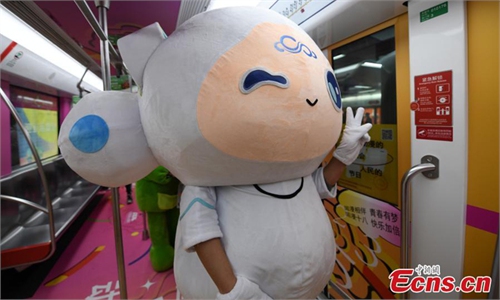ARTS / BOOKS
Full respect to ‘cultural ambassador’ Akira Toriyama for spreading Chinese culture overseas through his manga
Photo: Screenshot from twitter
In the Year of the Dragon, Akira Toriyama, the influential Japanese creator of global hit manga Dragon Ball, has died. Many Chinese fans paid tribute to the late artist by purchasing Dragon Ball collections as well as its anime garage kits on China's e-commerce platforms.
As someone from the Post-1990 Generation, Dragon Ball, together with other Japanese manga such as Slam Dunk and Detective Conan, was my great soulmate and companion during my childhood and puberty, a time when China introduced a lot of high quality Japanese manga and anime, leading to the Japanese mega-wave in the Chinese mainland. However, Dragon Ball is much more accepted among Chinese die-hard comic book lovers, as it drew inspiration from Journey to the West, one of the greatest classic Chinese novels.
For example, the name of the protagonist Son Goku is the Japanese pronunciation of Sun Wukong, the Monkey King in Journey to the West, while many of his tools are the same as those used by the Monkey King, such as his extendable staff and the cloud upon which he rides.
It can be said that Dragon Ball is a work that integrates various elements of Chinese culture. Toriyama chose Son Goku from Journey to the West as the hero, and adapted some of the images commonly seen in Hong Kong films into the images of warriors and masters in anime. In addition, he also gave Goku the personality of his idol Jackie Chan while revolving the plot around "collecting seven dragon balls."
With the global spread of Japanese manga in the 1980s, Dragon Ball was also adapted into an anime that has been dubbed in numerous languages, including Chinese. The "Japanese Sun Wukong" teenage growth story captivated the hearts of generations of manga-loving teens and adults, and influenced generations of manga artists and cartoonists all over the world.
Even now, the Dragon Ball universe remains one of Japan's most successful global hits. Toriyama has become a source of inspiration to many renowned Japanese manga artists, such as Masashi Kishimoto, the creator of the popular series Naruto, and Eiichiro Oda, the creator of one of the best-selling mangas One Piece.
Chinese netizens mourned Toriyama partly because he was a respected "cultural ambassador" between China and Japan who injected new validity into fine Chinese literature and made it come alive. He helped to introduce the traditional Chinese culture overseas under the big influence of Dragon Ball.
Fine culture needs to stay fresh by advancing with the times. Just as US superhero comics are constantly overturning worldviews and reshaping timelines, there must also be new characters and juvenile versions of classic characters from time to time.
The Son Goku in Dragon Ball not only inherited the traditional Chinese cultural elements of the original Monkey King, but also has a full sense of modernity and a unique Japanese style. In this comic book, Son Goku is not a monkey, but a powerful fighting force and an adventurous teenager. But he also shared with the Monkey King indomitable and courageous personality traits, which have inspired and enlighten many readers.
In addition, Toriyama, as a Japanese artist, made a lot of achievements in promoting cultural exchanges between China and Japan. Hong Kong filmmaker Stephen Chow posted a tribute to Toriyama on social media, with a picture of the poster that Toriyama drew for the release of Stephen Chow's film Journey to the West: Conquering the Demons.
Art knows no borders. Officials including China's Foreign Ministry spokesperson, French President Emmanuel Macron and Foreign Ministry of El Salvador expressed deep condolences over the passing of Toriyama.
This is an expression of our respect and appreciation for fine art, and also conducive to promoting more people of vision to actively participate in friendly cultural exchanges
In the current "pan-entertainment" era, we need to call for more literary and artistic works with deep spiritual cores that can reflect the aspirations of the vast majority of people.
Toriyama is no longer with us, but his work and spirit will always be with us.
The author is a reporter with the Global Times. life@globaltimes.com.cn




